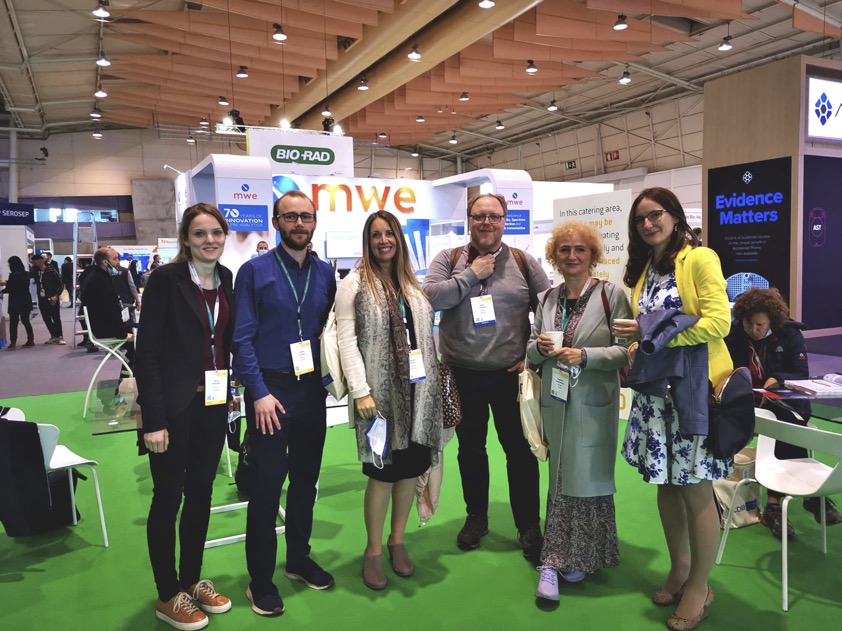As far as phage conferences go, there are a handful established favourites across the world where the who’s who meet to discuss those microbial viruses that we all know and love. Over the last years a new player entered the phield. Organised by ESCMID (the European Society of Clinical Microbiology and Infectious Diseases), the European Congress of Clinical Microbiology and Infectious Diseases (ECCMID for short) is a yearly four-day get-together of thousands of clinicians, researchers and industry representatives.
It was at this conference in 2018 in Madrid where I attended the session “Bacteriophages for antimicrobial therapy – what is the current evidence?” and heard about the history of phage therapy, the lessons learned from the PhagoBurn trial and the potential of phage therapy. For me this session was the moment I realized that my heart was irretrievably lost to all things phage.
Since the continued rise of antimicrobial resistance, an alternative to antibiotics for difficult to treat infections is becoming more and more pressing. ESCMID responded to this by including more and more sessions, posters and symposia regarding phages in their conference, and most recently by the creation of the new ESCMID Study Group for Non-traditional Antibacterial Therapy (ESGNTA). As the name indicates, they focus on various non-traditional antimicrobials from peptides to antibodies, and most importantly – phages. As part of their mission they have begun organizing several conference sessions to spread the word and to better integrate clinical and microbiological research. Which brings us to the 32nd ECCMID.
Picture it. Lisbon. The first in-person ECCMID since COVID-19 hit, with over 9,000 attendees on-site. A Master’s student one month into her thesis enters one of the first sessions of the conference.
Under the topic “New insights into phages: current challenges and future developments” Saija Kiljunen from Finland informs about preparation standards for personalized phage therapy, Krystyna Dabrowska shares her knowledge from the Polish Academy of Sciences about phage pharmacokinetics and the interplay with the immune system, Shawna McCallin from Switzerland gives an overview on clinical trials of the past and their challenges, and Tristan Ferry from France reports on the efficacy of phages. And I am falling in love all over again.
The phage phun continued the next day with another session organized by ESGNAT and the ESCMID Study Group for Antimicrobial Resistance Surveillance (ESGARS), titled “Fighting biofilm with non-traditional antibacterials”. Brushing off the remaining crumbs of my elevenses pastel de nata (those alone are worth the trip to Lisbon), I intently listened to Nuno Azevedo, who gave an insightful talk about antisense therapy and its effects against biofilms. Nuno was followed by Rob Lavigne, president of the International Society for Viruses of Microorganisms (ISVM), reviewing various phage-inspired leads for antimicrobials that go beyond classical phage therapy. Zuzanna Drulis-Kawa, President-Elect of ISVM, and Ran Nir-Paz, Chair of ESGNTA, were co-chairing the session. It might not come as a surprise to find several members of ISVM at ECCMID (the aforementioned Shawna McCallin being the Society’s Secretary). After all, ISVM’s mission includes creating a network of scientists working with microbial viruses and ECCMID offers a unique and vast assembly of scientists from all over the world.
Besides the presentations, there were countless (40+) posters featuring phage, ranging from phage isolation to prophages carrying immune evasion clusters. Combine that with the number of fascinating non-phage sessions and posters and industry booths handing out ‘Giant Microbes’ (I finally added Herpes and E. coli to my collection), and you get one happy scientist!
Overall it was a fantastic four days, in which I not only got a deeper insight into phage therapy and other phage-associated research, but most significant for me, I finally got to meet the people I previously have only known through a screen. For the last two years most conferences were held online, and the organizers did amazing jobs, yet nothing quite compares to trying to translate a Portuguese dinner menu together, before eventually resigning to the English version, or having a cup of coffee while discussing ongoing research.







